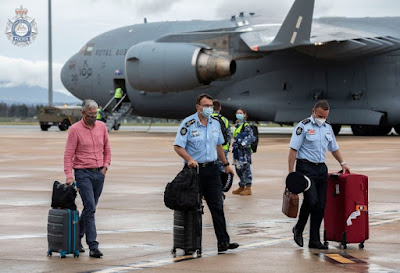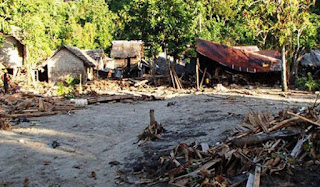GUADALCANAL CHIEF QUESTIONS G-PROVINCE'S LABOUR MOBILITY PROGRAMME
BY GEORGINA KEKEA
A
Chief from North Guadalcanal is questioning how the labour mobility programme
in Canada will assist the Guadalcanal Provincial Government (GPG).
Benedict
Garimane told Island Sun he has been wondering how the province will benefit
from the programme.
He
said over the years, Guadalcanal has been sending workers to Canada but
tangible benefits from the programme is yet to be felt or seen.
He
said lack of health and sanitation facilities continues to be a problem in the
province.
Lack
of classrooms and infrastructure are still a problem in Guadalcanal province
and he questions how GPG will recover the monies spent on sending the workers
to Canada.
“I do not have anything against the labour
mobility programme. In fact I think the programme is a very good one.
“However I
am concerned about the amount of money spent on these workers to go to Canada. How
will GPG benefit from them?
“Do
they send their remittances back to GPG to go towards development in
Guadalcanal province as a way of repaying GPG or how do they help in the
development of Guadalcanal province by working in Canada?”
Garimane
says though the programme is highly commended, it still leaves more room for questions
than answers.
He
said even the selection of workers to go to Canada does not reflect a fair
distribution of people from Guadalcanal province.
“We
have 21 wards. They should select from the wards instead of just selecting
workers from the two ends of the island.
“Even
North Guadalcanal who is the biggest contributor in terms of bringing in money
for GPG has not seen any of its constituent benefit from that programme.”
Garimane
questioned if this programme is for the whole of Guadalcanal or for only
certain parts of Guadalcanal.
He
said why he is raising this concern is because GPG represents everyone on
Guadalcanal.
“The
government belongs to us. We want to know how GPG will reimburse the monies
spent on sending workers to Canada.
“Millions
of dollars had been spent on a few people only, while the majority looks on
silently.”
In
response to Garimane’s concerns, GP External
Affairs and Communications, Mack Fadden
Aoraunisaka says GPG only started sending workers to Canada towards the end of
2016.
He
clarified that GPG never spent any money on workers going to Canada. Instead it
is the employer that meets the travel costs while CITREC Canada meets all
immigration costs, if there is any.
Aoraunisaka
said that they (GPG) will benefit from remittance.
“There
is a GPG account where money shall be remitted to. However please note we just
started sending people to work in Canada, benefits and recovery is a long term
prospect. We can’t just recover the amount overnight,” Aoraunisaka said.
He
said there are lots of benefits for Guadalcanal province besides the remittance
aspect.
“There
is the education benefit and exposure benefit, meaning our workers working in
Canada upon their return can bring in more skills and knowledge to boost our
tourism and hospitality and agriculture sector.”
Aoraunisaka
said GPG paid for CITREC the education component, trained the locals and have
them graduated with Canadian standard in Tourism and Hospitality and
Agriculture certifications.
“The applications to undertake CITREC training
is done fairly since there is a quota per Ward and application must be endorsed
by an MPA. Students who graduate from CITREC are job ready.
“They have education and qualification of Canadian
standard and can work anywhere in the Solomon Islands and in Canada with their
qualification.
“However the misconception is that once you
graduate, you should automatically fly to Canada and that there is a job for
you over there, that is not the case,” Aoraunisaka clarified.
He said selection of workers going to Canada is
merit based and done in Canada by the employer.
“GPG and GPEA and CITREC
Canada have no influence over this part of the process. The employer
choose who he want to work for him.”
Aoraunisaka
encourages Guadalcanal people to come to GP Headquarter to seek clarification
on the CITREC programme.
ENDS///





Comments
Post a Comment